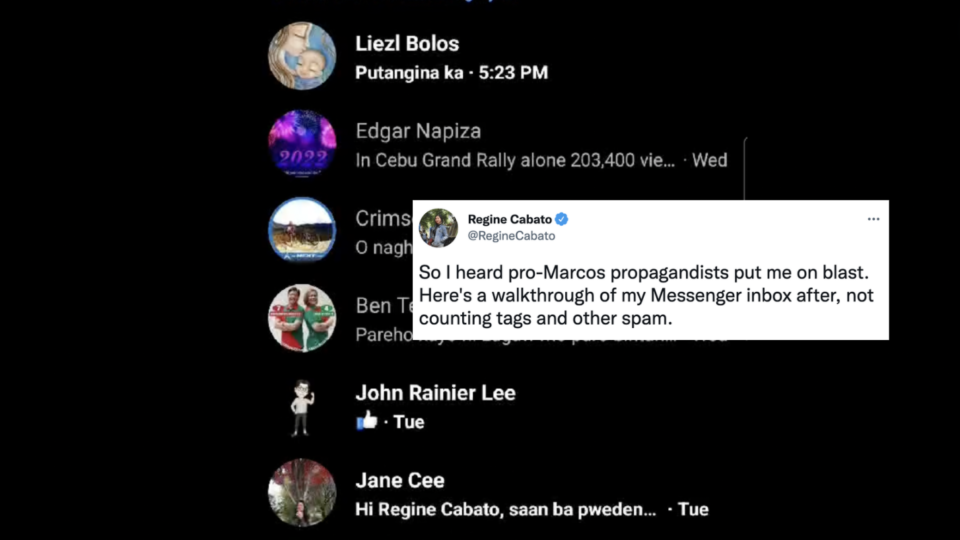Washington Post reporter Regine Cabato shared that she had been targeted by social media accounts defending Ferdinand “Bongbong” Marcos Jr. immediately after her story detailing efforts to rehabilitate the Marcos family’s image and bolster his campaign through online propaganda went live.
The report chronicled findings from her months of investigative work tailing pro-Marcos accounts on social media platforms such as Facebook, Twitter, TikTok, and YouTube, as well as interviews with insiders who explained what the going rates were for troll farm and social media moderators tasked with spewing pro-Marcos messages.
“So I heard pro-Marcos propagandists put me on blast. Here’s a walkthrough of my Messenger inbox after, not counting tags and other spam. If anything, this demonstrates the machinery we described in our report,” Cabato tweeted.
The reporter proceeded to post screen recordings of the deluge of messages she received, including old message requests from accounts that have since been suspended by Facebook.
Gotta admit I was blindsided when the initial hate poured in from LinkedIn, of all places (video below from my IG story). Guess it struck a nerve among people whose job it is to do this? 🤪 Comments echoed a script, a system we elaborated on in our report: https://t.co/nZYNVD4DYI pic.twitter.com/1MW0ZzO0oZ
— Regine Cabato (@RegineCabato) April 21, 2022
Cabato also showed the comments on her LinkedIn page, admitting that she was “initially blindsided” by the backlash on the professional networking platform.
“Comments echoed a script, a system we elaborated on in our report,” she wrote.
Cabato’s piece, “How the Philippines’ brutal history is being whitewashed for voters” exposed how much workers within the well-established disinformation network are able to make. The report referenced fact-checking coalition Tsek.ph’s findings that showed Facebook, YouTube, and TikTok were the leading sources of online disinformation in the country.
Myths about the Marcoses are rife on these social media platforms, ranging from claims that the astrologer Nostradamus predicted Marcos Jr.’s presidency to the Marcos family inheriting tons of gold which will be distributed to the public if Bongbong gets elected.
Cabato’s piece also detailed the portrayal of Bongbong’s son Sandro as a TikTok heartthrob. Sandro is currently up for a congressional seat in Ilocos Norte, the Marcoses’ home province, and the report argues that the heartthrob framing is being used as a deliberate tactic “meant to cement the dynasty’s future among Gen Z and future generations.”
Citing veteran campaign strategist Alan German, Cabato’s report estimates the salary of the troll network moderators in charge of writing the daily “script,” or talking points used to defend their political clients, range between PHP40,000 to PHP50,000 (US$700 to 800) each month.
Meanwhile, a micro-influencer with 10,000 followers posting seeded messages during election season could earn a monthly retainer between PHP300,000 to PHP350,000 (US$5,000 or more), including bonuses.
The report also cited a source who bared that they received a job offer with a salary range of PHP25,000 to PHP30,000 (US$478 to US$573.50), with higher pay if they spoke in Ilocano, the majority tongue in Northern Luzon, where the Marcoses are from.
Readers can freely access Cabato’s piece on the Washington Post today without a subscription as the company has turned off its paywall in honor of Earth Day.




